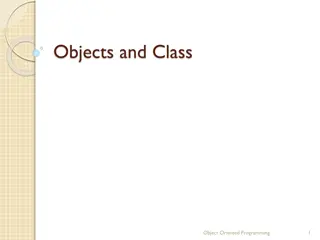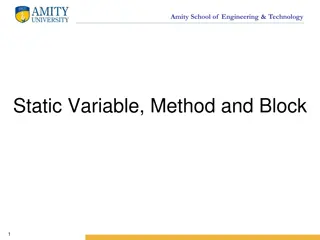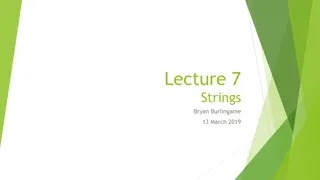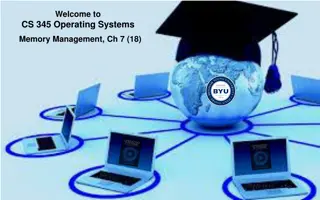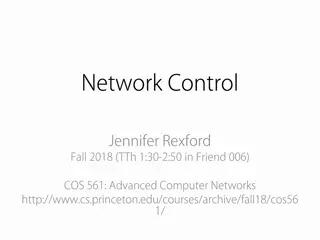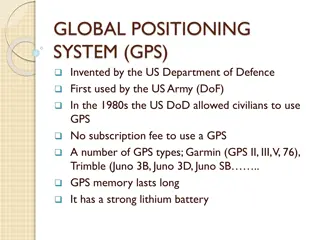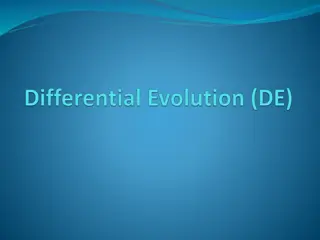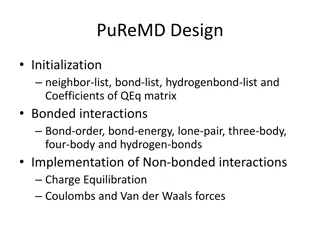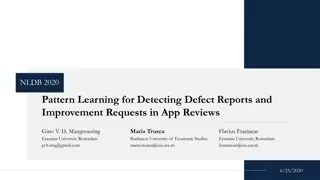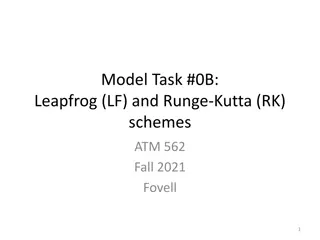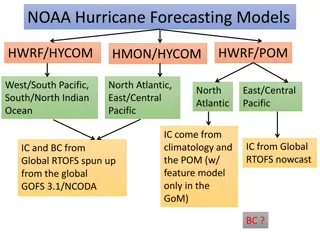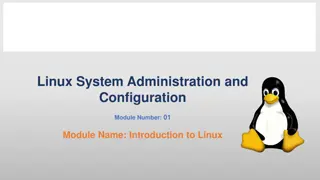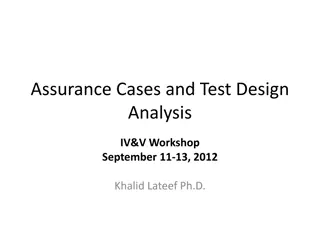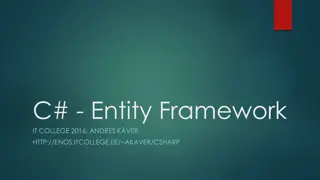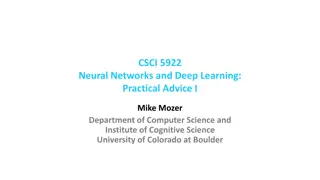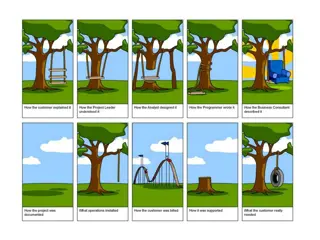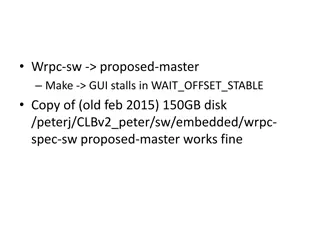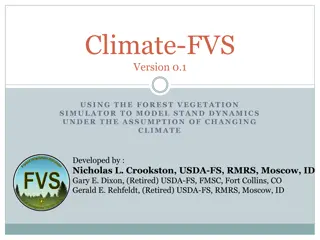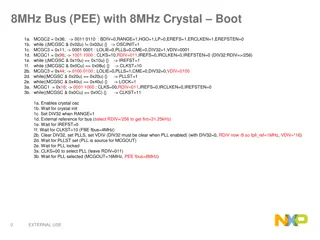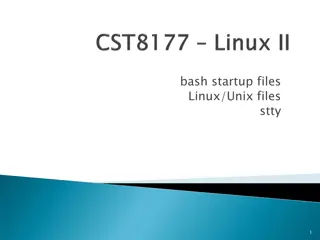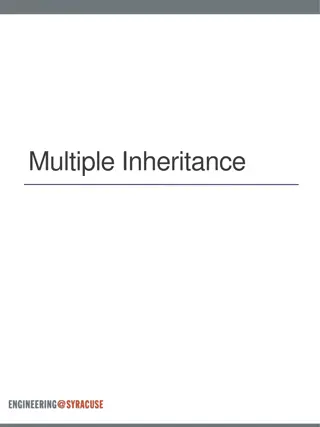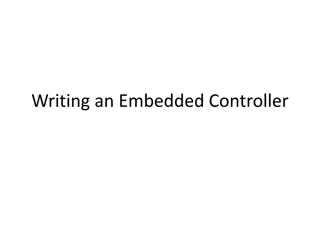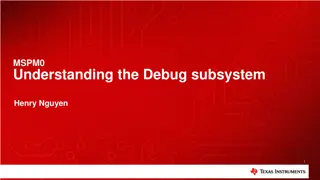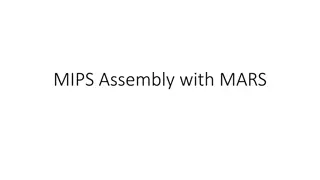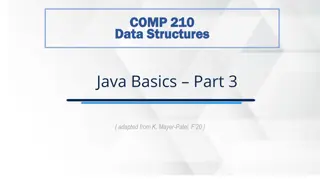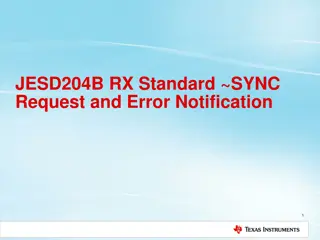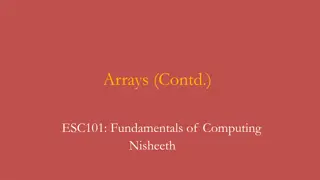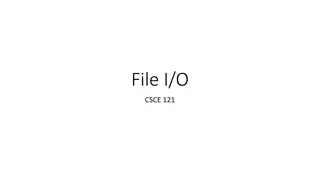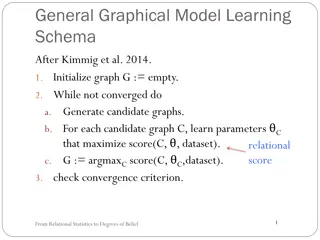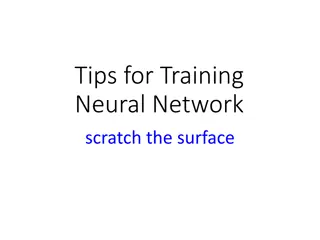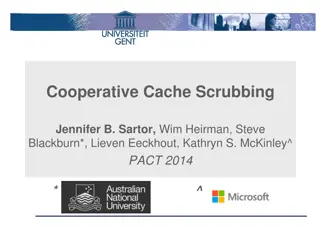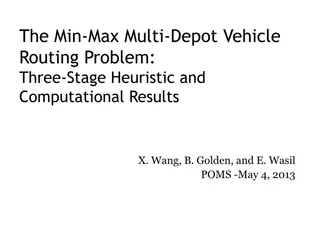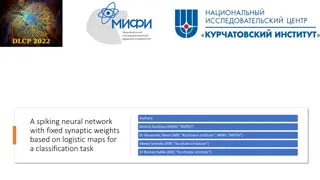Object-Oriented Programming Concepts
Object-oriented programming enables the effective development of large-scale software and GUIs by defining classes to represent entities in the real world as objects with unique identities, states, and behaviors. Objects have data fields representing their properties and methods defining their actio
2 views • 70 slides
Static Variables and Methods in Java
Static variables in Java belong to the class rather than instances of the class and are initialized only once at the start of execution. They can be accessed directly by the class name. Similarly, static methods can access static variables directly without creating an object. This content explains t
3 views • 20 slides
Strings in Python Programming
Strings in Python are sequences of characters with various operations like initialization, accessing, traversal, slicing, and mutability. Learn about basic concepts, such as string initialization using quotes, accessing individual characters, determining string length, traversing strings, slicing su
1 views • 20 slides
One-Dimensional Arrays in C Programming
Arrays in C are collections of variables of the same data type that allow storing a group of data. This article covers the basics of one-dimensional arrays in C, explaining syntax, declaration, initialization, and accessing elements. It also provides examples and a sample program to demonstrate arra
1 views • 26 slides
Monte Carlo Transport Simulation
Monte Carlo simulation is a stochastic technique that uses random numbers and probability statistics to investigate and solve problems. In the context of transport simulation, a Monte Carlo program simulates the passage of particles through matter, involving geometry, transport, visualization, detec
0 views • 11 slides
Operating System Memory Management in CS 345
This content delves into the intricate processes that occur when a computer boots up, the concept of virtual memory, demand paging, page faults, and simple paging in operating systems memory management. It discusses the initialization steps, paging mechanisms, and hardware considerations involved in
0 views • 12 slides
Introduction to Strings in C++ Programming
In C++, strings are arrays of characters that can hold letters, numbers, symbols, and end with a null character '\0'. String manipulation involves operations such as assignment, concatenation, comparison, and input/output. The declaration, initialization, and basic operations on strings like joining
0 views • 24 slides
Network Routing Algorithms and Protocols Overview
Understanding network routing algorithms and protocols is crucial in the field of networking. This content provides insights into the initialization process, loop prevention mechanisms, and the use of algorithms like OSPF and IS-IS. It also touches on routing protocols such as RIP and EIGRP, explain
0 views • 17 slides
Global Positioning System (GPS) Technology
Explore the invention and evolution of GPS, its safe handling, examples of GPS receivers, how GPS works through satellite communication, and the role of satellites in GPS technology. Delve into receiver initialization methods for accurate location services.
0 views • 15 slides
Differential Evolution: An Overview of the DE Algorithm
Differential Evolution (DE) is an Evolutionary Algorithm (EA) proposed for continuous function optimization. It uses vector differences to perturb the population, deviating from traditional crossover and mutation methods. DE involves mutation, perturbation, and various mutation schemes like DE/rand/
0 views • 20 slides
PuReMD Design - Initialization, Interactions, and Experimental Results
PuReMD Design involves the initialization of neighbor lists, bond lists, hydrogen bond lists, and coefficients of QEq matrix for bonded interactions. It also implements non-bonded interactions such as charge equilibration, Coulomb's forces, and Van der Waals forces. The process includes the generati
0 views • 23 slides
NLDB 2020 Pattern Learning for Detecting Defect Reports and Improvement Requests
This research paper focuses on automatically learning patterns to detect actionable feedback in mobile app reviews, specifically identifying defect reports and improvement requests. The main goal is to develop a mechanism that can effectively classify feedback types using both manual and learned pat
0 views • 17 slides
Leapfrog and Runge-Kutta Schemes for 1D Linear Wave Equation Model
Explore the Leapfrog (LF) and 3rd order Runge-Kutta (RK) schemes in modifying the 1D linear wave equation model. The Leapfrog scheme is centered in time and space, offering advantages and disadvantages compared to the upstream method. Understand how these schemes handle time integration and spatial
0 views • 27 slides
NOAA Hurricane Forecasting Models Overview
The NOAA hurricane forecasting models include HWRF, POM, HYCOM, HMON, covering regions like the Pacific, Indian Ocean, North Atlantic, and Gulf of Mexico. These models utilize a combination of climatology data, feature models, and real-time RTOFS inputs for initialization and forecasting. Various co
1 views • 14 slides
Overview of the Linux Boot Process
Exploring the six stages of the Linux boot process, starting from the BIOS and Master Boot Record (MBR) to the Grand Unified Bootloader (GRUB) and kernel initialization. Understand the essential components involved in booting up a Linux system, from system integrity checks to mounting the root file
1 views • 18 slides
Assurance Cases and Test Design Analysis Workshop Overview
Explore the challenges and strategies in assurance cases and test design analysis, with a focus on IV&V techniques for critical systems like automobiles. Learn about triggers, test scenarios, off-nominal behaviors, and possible inputs for effective testing. Dive into the nuances of test design valid
0 views • 24 slides
Entity Framework in C# for Database Management
Entity Framework in C# offers a powerful ORM solution for data manipulation and database management. It allows developers to work with databases in an object-oriented manner, simplifying the handling of database operations. Learn about ORM, Code First approach, conventions, DbContext usage, and data
1 views • 21 slides
K-means Clustering for Image Segmentation
Dive into the world of K-means clustering for pixel-wise image segmentation in the RGB color space. Learn the steps involved, from making copies of the original image to initializing cluster centers and finding the closest cluster for each pixel based on color distances. Explore different seeding me
0 views • 21 slides
Best Practices in Neural Network Initialization and Normalization
This resource provides practical advice on input normalization, weight initialization, Xavier normalization, and Glorot/Bengio normalization in neural networks. Tips include the importance of controlling the range of net inputs, setting initial weights appropriately, and understanding the rationale
0 views • 15 slides
Design Patterns in Software Development
Learn about design patterns in software development, including creational patterns like Singleton, Factory, and Builder. Discover how design patterns provide solutions to common programming problems, increase code flexibility, and improve program design. Gain insights into the concepts of Singleton
0 views • 33 slides
Population Initialization Techniques for Rolling Horizon Evolutionary Algorithms in General Video Game Playing
Rolling Horizon Evolutionary Algorithms (RHEA) in General Video Game Playing (GVGP) show promise for faster evolution, but there is a lack of clear analysis in the existing literature. This study explores population initialization techniques for RHEA in GVGP, assessing methods like One Step Look Ahe
0 views • 17 slides
Troubleshooting GUI Stalls and Git Updates in Wrpc-sw Repository
Resolve issues related to GUI stalls and Git updates in the Wrpc-sw repository. Includes guidance on checking out specific commits, submodule initialization, and updating. Also addresses update functions, state management, and configuration settings in the code.
0 views • 25 slides
Climate-FVS Model for Forest Stand Dynamics
Explore the Climate-FVS model, a tool using the Forest Vegetation Simulator to project stand dynamics in the face of changing climates. Learn about the model's architecture, operation, variants, and its integration with climate models. Discover the process flow from stand initialization to projectin
0 views • 26 slides
Configuring 8MHz Bus with 8MHz Crystal for PEE Mode
Configuring a system with an 8MHz bus using an 8MHz crystal for PEE (PLL Engaged External) mode involves a series of steps such as setting register values, waiting for specific conditions to be met, selecting clock sources, and ensuring PLL stability. The detailed configuration process ensures prope
0 views • 4 slides
Bash Startup Files and Shell Customization
Learn how to customize your shell behavior in Linux/Unix by setting environment variables, aliases, and shell options using bash startup files. Discover the importance of ~/.bash_profile and ~/.bashrc in shell initialization and configuration. Understand how login and non-login shells execute comman
0 views • 13 slides
Multiple Inheritance in Object-Oriented Programming
Multiple inheritance in object-oriented programming allows a derived class to inherit from more than one base class, creating a unified derived class. This design structure is suitable when the base classes are orthogonal and have no common attributes or behaviors. The derived class logically combin
0 views • 14 slides
Embedded Controller Programming Basics
Learn the fundamentals of writing an embedded controller program, including initialization, main loops, and handling input tasks. Explore a simple program that prints messages periodically and processes key inputs effectively. Advance to a slightly more complex version with menu functionality trigge
0 views • 11 slides
An Overview of MSPM0 Debug Subsystem
Understanding the MSPM0 Debug Subsystem by Henry Nguyen covering topics such as expected behaviors in low-power mode, SWD initialization sequence, modifying PWR-AP for low-power handling, utilizing RSTCTL bits, and more. The content includes details on proper sequences, behaviors in low-power states
1 views • 11 slides
Introduction to MIPS Assembly Programming with MARS
Introduction to MIPS Assembly Programming with MARS including instructions, I-Type format, register initialization, addi instructions, and translation to machine code using an assembler. Learn how to perform basic arithmetic operations in MIPS assembly language.
0 views • 61 slides
Structures and Unions in C Programming
Exploring the concept of structures and unions in the C programming language, this reference material covers their definition, initialization, assignment, members, arrays, and nested structures. Learn how structures aggregate data types and how unions can share memory locations. Gain insights into s
0 views • 20 slides
Basics of Java Arrays and Array Manipulation
Learn about the fundamentals of Java arrays, including initialization, literals, indexing, and the special value of null. Explore how arrays function as reference types and how array cloning can be used to create shallow copies. Understand the implications of passing arrays to methods and how change
0 views • 44 slides
JESD204B RX Standard Synchronization and Error Handling
Explore the key functionalities of the JESD204B RX Standard, including synchronization requests, error detection, and reporting mechanisms. Learn about synchronization upon initialization, error handling requiring re-initialization, and more for reliable data link setup in JESD204B interfaces.
0 views • 11 slides
Arrays in Computer Programming
Arrays in programming are collections of elements that have the same data type. Elements in an array are accessed using integer-valued indices. Arrays inescapably play a crucial role in programming as they allow for efficient storage and manipulation of data. Initialization, declaration, and utiliza
0 views • 14 slides
Arrays Review and Code Challenges
Explore arrays in programming through a review of array values and initialization methods. Dive into code challenges involving array operations and manipulation to test your understanding. See the output of code snippets to further solidify your knowledge.
0 views • 22 slides
Efficient File I/O Handling in C++
Effective management of file input and output operations in C++ is crucial for smooth program execution. The Resource Acquisition Is Initialization (RAII) technique offers a preferred approach for interacting with file streams, ensuring proper resource handling during an object's initialization and
0 views • 6 slides
Learning Bayesian Network Models from Complex Relational Data
Delve into the process of learning Bayesian network models from complex relational data, extending traditional algorithms to suit relational data structures. Explore key concepts like likelihood functions, graphical model initialization, and parameter learning for effective model fitting.
0 views • 20 slides
Essential Tips for Training Neural Networks from Scratch
Neural network training involves key considerations like optimization for finding optimal parameters and generalization for testing data. Initialization, learning rate selection, and gradient descent techniques play crucial roles in achieving efficient training. Understanding the nuances of stochast
0 views • 23 slides
Cooperative Cache Scrubbing for Efficient Memory Management in Multicore Systems
Cooperative Cache Scrubbing optimizes memory management in multicore systems by efficiently handling short-lived application objects and reducing unnecessary data writes to memory. By communicating semantic information to hardware caches, dead lines are scrubbed, dirty bits unset, and unnecessary fe
0 views • 40 slides
Heuristic Approach for the Min-Max Multi-Depot Vehicle Routing Problem
This study explores a three-stage heuristic to solve the Min-Max Multi-Depot Vehicle Routing Problem (MDVRP), aiming to minimize the maximum distance traveled by vehicles. It covers an introduction to the problem, literature review, the importance of the min-max objective, and a heuristic solution m
0 views • 21 slides
Spiking Neural Network with Fixed Synaptic Weights for Classification
This study presents a spiking neural network with fixed synaptic weights based on logistic maps for a classification task. The model incorporates a leaky integrate-and-fire neuron model and explores the use of logistic maps in synaptic weight initialization. The work aims to investigate the effectiv
0 views • 8 slides
